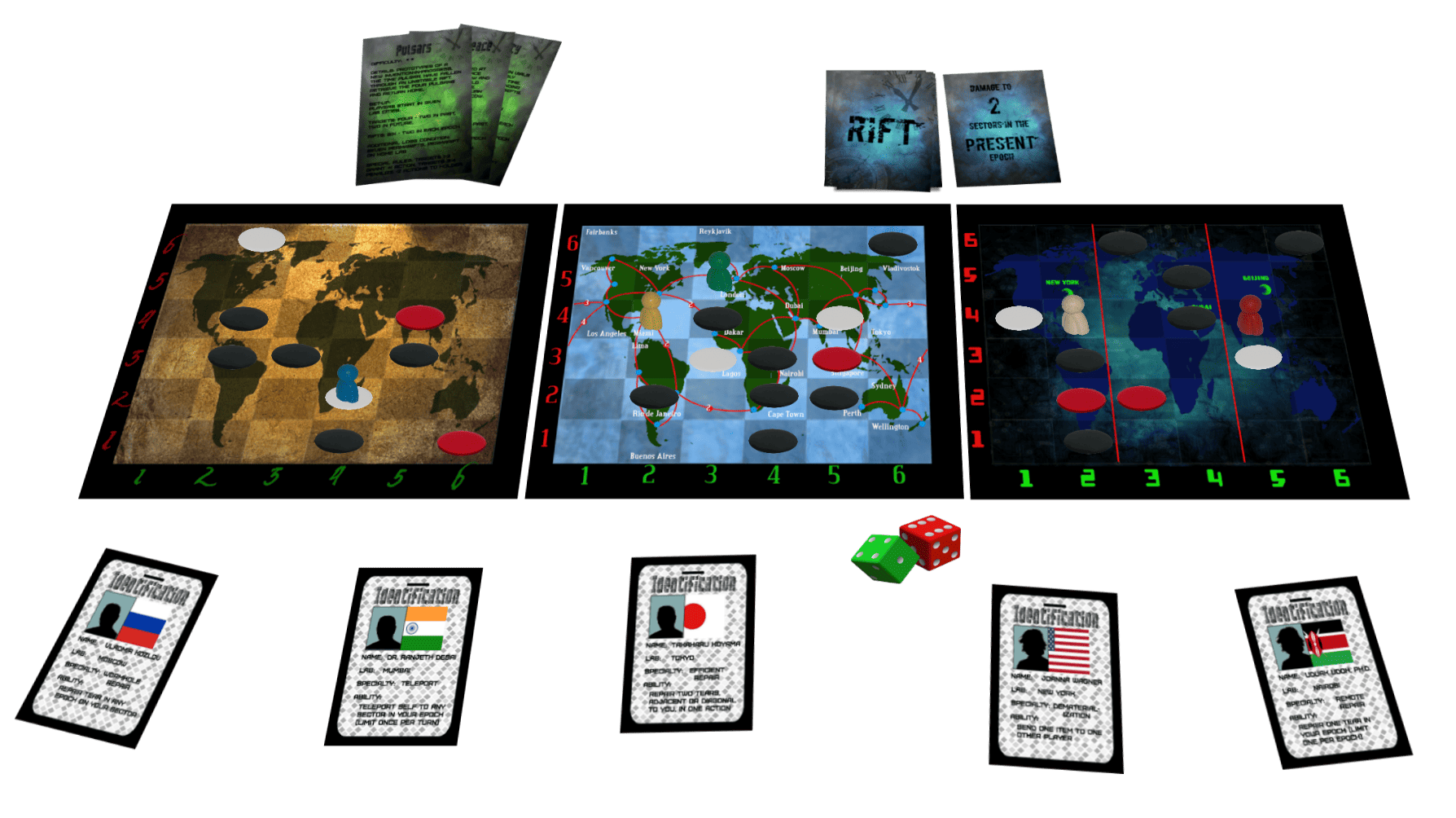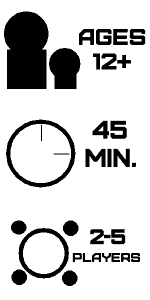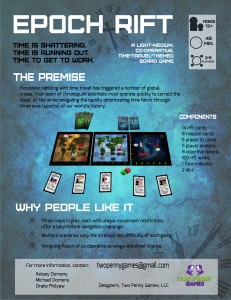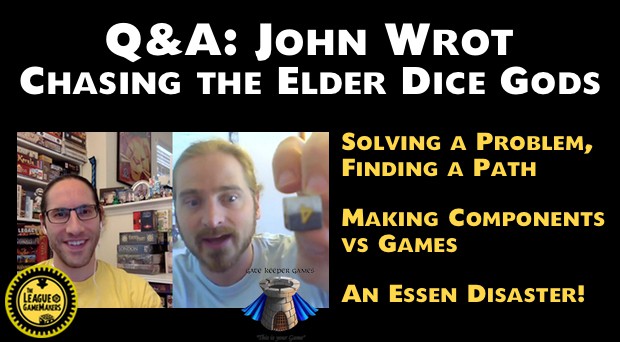
ON AUGUST 16, 2014, 15 DESIGNERS AND 12 PUBLISHERS GATHER FOR ONE NIGHT TO DATE EACH OTHER 6 MINUTES AT A TIME.
Designer/Publisher Speed Dating at Gen Con is exactly what it sounds like. It’s speed dating – without the good night kiss. Designers set up their games at tables and get 6 minutes to pitch it to publishers in attendance (Beg them to love me) before the publisher moves on to the next table. By the end of the night, you may be courting several publishable bachelors, or you may go home and cry into your pillow because no one loves you. Either way – for the designers and publishers alike, the evening is time well spent in the industry.
JR Honeycutt of The DFW Nerd Night, the Nerd’s Table Reviews, and the YouTube show, Back It! came to Gen Con with a cameraman and a dream. They sat down with publishers, designers, and the event creator, James Mathe, to document the speed dating event. He has published a short article on his site and the videos on YouTube, but since 6 out of the 9 videos they produced showcase faces from this League, we couldn’t help but share it with you as well.
My business partner and friend, Drake Philyaw, and I took our time-travelling co-op game, Epoch Rift, to what was our first time at a speed dating event.
I LOVED IT.
It combined all my favorite things – games, meeting new people, presenting. I was ready, but even so, about an hour before the event my fellow Leaguers saw my crying over my prototype. (sorry guys). I was so nervous! The last time I had pitched a game was the Tabletop Deathmatch in 2013. But that was with a pre-set presentation that I had practiced 15 times. Sitting down in a situation where these publishers would ask questions and give immediate feedback was a terrifying thought to me. So, while hanging out beforehand, Luke Laurie offered to let me practice – I broke down. Ugly cry. Once that was over- they gave me awesome advice that I will now share with you:
1. Start the pitch with these key points:

- The name of the game
- The kind of game it is
- Number of Players
- Play time
- Win Condition
- Loss Condition
According to Jeff Cornelius, if he doesn’t hear these things at the beginning, he will not care about the rest of your pitch. So, with Epoch Rift, my opening went like this:
“You are looking at Epoch Rift. It is a co-operative time travel game in which you play a team of chrono-punk scientists who are trying to save the world that you also have a hand in destroying. It is a 2-5 player game that lasts about 45 minutes. You win by completing a mission that has been determined at the start of the game. You lose if the time/space fabric becomes overly destroyed by ‘perma-rifts’ before the mission is complete. Additional loss conditions include losing any player or target in a ‘perma-rift.’” They don’t know what “perma-rifts” are, but that will be explained later. Right now, at the start, they know the basics that they need in order to frame the rest of the pitch.

2. After this you can go into what a turn looks like and discuss key mechanics
In addition to this, I found in the actual pitch that you can leave things unsaid in your initial speech. These industry pros know what questions to ask to get the information they need. And, by looking at the prototype, they were able to ask the questions about mechanics conversationally. I ended up saying everything I would have said anyway, but without a giant speech at the front end.
 3. Know what makes your game unique.
3. Know what makes your game unique.
It may benefit in some ways to say that Epoch Rift is in the vane of Pandemic. Pandemic sells well, people like it. If this game is like that, maybe it’ll sell, too! But, you must know what makes your game different as well. And for that I certainly needed an outside look. I haven’t been in this industry as long as Tom Jolly, or even Luke, Jeff and Peter. So, when I did my practice pitch and started claiming the things I thought were unique, they were able to say, “actually, this element is in games a, b, and c. But what your game DOES have is x, y, z.” This also applies when writing up your sell sheet. For more on that, check out Luke Laurie’s article.
4. Focus on what’s fun about your game
Borrowing advice from Mike Selinker, Peter Vaughan passed this on to me. I don’t think it was in context of pitching, but it fits. It fits at every level of game making. When you’re designing – focus on what’s fun. When you’re pitching – focus on what’s fun. When you’re selling at a booth or Kickstarter – focus on what’s fun.
5. Be Ready
I encourage you to watch the videos for yourself, but after watching them, the main thing I came out with from the publisher interviews was to be ready. If you don’t think your game is ready to be published, you shouldn’t be pitching it to a publisher. That doesn’t mean that if they take it on they won’t continue development, or that you shouldn’t be open to changes they suggest. But you should have the game as ready as you think it could be. Going into a meeting or event like this with uncertainty and apologies for your game will likely just get your game back in your hands at the end of the night.
In the following videos you will see:
- James Mathe, creator of the event
- Myself and Drake Philyaw, Two Penny Games
- Publishers and League members, Jeff and Nathan Cornelius, Cosmic Wombat Games
- Daniel Hadlock and Seth Jaffe, Tasty Minstrel Games
I hope you can learn from our pitches and develop your own pitch to best sell your game. Also, the value of what Cosmic Wombat and TMG say in their interviews cannot be overlooked. So, watch through all nine videos, or use the arrows below to scroll through them.
The video content is as follows:
1) A brief interview with James Mathe
2) TMG’s expectations for the event
3) Two Penny Games’ expectations for the event, and their preparation for their first event
4) Cosmic Wombat’s expectations for the event
5) Epoch Rift demo’d to Cosmic Wombat
6) Epoch Rift demo’d to TMG
7) Cosmic Wombat’s experience and recap
8) TMG’s experience and recap (bonus guest!)
9) Kelsey and Drake’s impressions of the event
And a thank you to JR Honeycutt, John Staton and Cody Lewis for the creation of these videos. You’re awesome!
That’s my perspective – first time pitching a game in the Speed Dating event. Want a backstage pass into the mind of a publisher at this event? Stayed tuned for Part 2 of Designer/Publisher Speed Dating at Gen Con as Nathan Cornelius, of Cosmic Wombat Games, gives his thoughts on the event from the publishers’ perspective!








